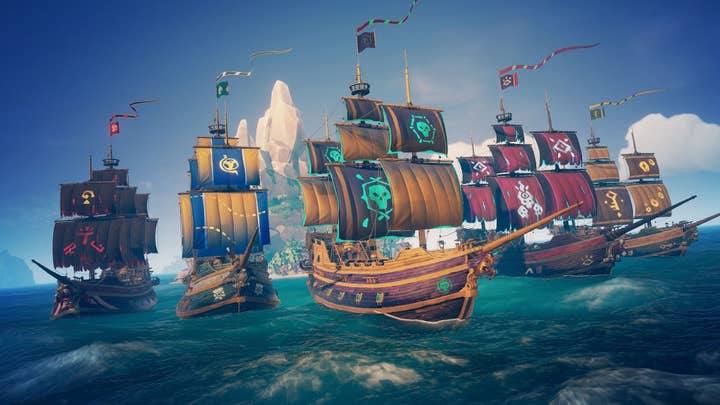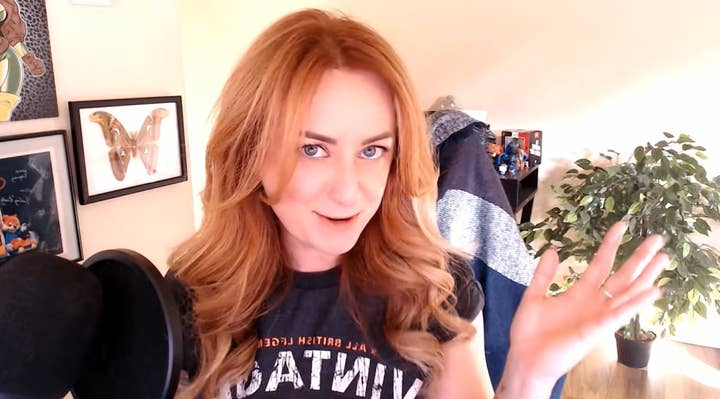"Nothing is a barrier to being a developer – except maybe yourself"
Rare's Louise O'Connor discusses the industry's biggest changes during her career, and encourages the next generation to push things further
At last week's GI Academy Online – our annual event aimed at students – keynote speaker Louise O'Connor of Rare fame shared what she felt had changed the most during her time working in games, as well as the opportunities facing new generations seeking a career in the industry.
O'Connor joined Rare back in 1999 as an animator, having trained at Dublin's Ballyfermot Senior College. She has contributed to nearly all of the developer's subsequent projects, and is perhaps best known amongst the studio's ardent fanbase for her animation and voice work on Nintendo 64 title Conker's Bad Fur Day. Since being hired over 23 years ago, she has risen to the position of executive producer on one of the studio's current projects, multiplayer fantasy adventure Everwild.
The first significant change that O'Connor has noticed during her career in games is how the audience has broadened. Not only that but how publishers and developers measure their success is dramatically different.
"We are makers and builders and tinkerers and creators. So make, build, tinker and create. Do this as often as you can"
"When we released GoldenEye, it became the third best-selling game on the N64 with over eight million copies sold," O'Connor says. "That's a culmination of sales over a few years. It wasn't just a hit release straight after it launched. These were – and still are – big numbers.
"Back then, we measured our success on hard copies sold. Now, we don't. We focus on making sure that those players playing return, how long they play, how do we keep them sticky? Our audience back in '99 was pretty much exclusive. Gaming back then was a new and expensive hobby."
One of the obvious changes that have occurred within the video games audience is that there are far more women playing games than ever before. At the time, titles focused on attracting a female audience were few and far between, but these days women make up around half of the audience for games around the world.
"The numbers of female games fluctuated from console to console and game to game," O'Connor explains. "In fact, Pac-Man, a game created specifically to appeal to wider audiences, was one of the only games in the late '80s and early '90s actually to appeal to a female demographic.
"Audiences have changed. There are now over three billion gamers across the globe, and almost half of gamers identify as female. Games are far more accessible than ever before thanks to things like Game Pass or being able to play on PC or mobile devices. Our audience potential for every game we create is huge, so it's more important than ever that we as developers represent that audience."
Fortunately, O'Connor said, the industry's workforce has also transformed over the years – although she noted there is still a lot of work to be done, citing a Zippia survey that reported only 23.7% of US-based developers in 2022 identify as female. According to the same survey, over 71% are of white ethnicity.
"If making a game makes you feel the stress of a brain surgeon, we should have a conversation"
"These changes are still quite small compared to what they need to be. The biggest change is that now 60% of game developers are over the age of 40. We've actually all grown up with this industry. The good change is that we have this diverse range of ages represented in our game development teams which does actually represent the age demographic of our players.
"Diversifying our teams is better than when I first started and despite it not improving nearly half enough, the change I have seen is more and more support for underrepresented and minority groups in the industry. We're better listeners than ever before and I feel threads of incredible supportive communities and networks all around us. But there is still work for us to do here and I implore you, as the future of the industry, to do this work as you enter games so that in 20 years, you could be here and tell a very different story.
"My takeaway from this is always to seek perspectives other than your own. Creatively, you'll ultimately be a better developer if you seek feedback from players who are different to you. Be curious and be inclusive. Thinking differently leads to a lot of creative thinking in this industry."

O'Connor also discussed how the video games industry has been driven by technology, arguably more so than any other form of entertainment. She compared the industry's advancement with film; moving pictures were first shown to a paying audience in 1895 by the Lumière brothers, and the mid-1930s most films featured both sound and colour.
"To get to colour and sound in films, it took 40 years. Think about that – we've been making films since 1895 and the biggest change in recent years has to be our move to 4K digital or we can watch 4K at home in our sitting rooms.
"This industry is super fast-paced. We can be nostalgic on occasion, but man do we love a new engine and all the frills and tech that comes with it"
"In comparison to films, Pong – the first successful commercially released game – launched in 1972. It started with lines of coding language which a person could interact with and control based on a simulated game of tennis. In the 50 years since, the language, our capabilities, the visuals, the design, the engines and the overall technology and creativity has completely changed and evolved, thus changing the experiences we deliver to audiences everywhere.
"This industry is super fast-paced. We can be nostalgic on occasion, but man do we love a new engine and all the frills and tech that comes with it. I really like the comparison to the film industry because I actually believe that people for a long, long time have underestimated the power and the creativity and passion that the games industry has to offer."
Not only is the games industry advancing much faster than movies like-for-like; the stats reveal that it is a much more successful business money-wise.
"This year, the film industry is worth approximately $76.7 billion," O'Connor explains.
"That sounds like a lot. The games industry is worth over $180 billion. We're actually more successful. We make more profit than the movie industry and music industry combined. We absolutely should not be underestimated. I believe this marriage of new audiences, new technology and a real desire to push and do more has been responsible for the change in the gaming landscape that we see. There really is something for everyone on every device.
"Always seek other perspectives. Creatively, you'll ultimately be a better developer if you seek feedback from players different to you"
"We as an industry strive to seek out new ways to build experiences for our three billion potential players. We've embraced indie – what a wonderful space to have. We've encouraged creativity by giving developers access to lots of ways to create and express themselves, from paper prototypes to building in Java and Unity. Nothing is a barrier to anyone being a developer, except maybe yourself."
With that in mind, O'Connor urges students and aspiring developers to build up their skills simply by making things. The accessible nature of engines like Unity mean anyone can experiment and learn how to make small games and prototypes while they seek their place in the industry.
"Get involved with jams, make a paper prototype, watch some tutorials and build something in Unity, [or] create a video that pitches a game," O'Connor insists.
"We are makers and builders and tinkerers and creators. So make, build, tinker and create. Do this as often as you can. What does this all mean for the future of the games industry? It means that there are many, many unmade games, which sounds sad. But let me put this another way; I think it means there are many new games that have yet to be developed and experienced by players everywhere.
"I may be biased, but the games industry is the most exciting and innovative industry to be a part of. You just need to look at our 50-year journey so far; I cannot even imagine what the keynote speaker at GI Academy in 50 years will be talking about, but I hope I am around to see it.
"What I do know is that games are more accessible, more beautiful, more technical and they're more creative than ever before. We are capable of creating whole worlds for people to escape to and share with others, where friendships are born and nurtured, and where communities are grown and supported."
Finally, O'Connor emphasised the importance of game developers new and old enjoying their work. There are many stories about the amount of pressure on those in the industry, but it's important to remember games are an entertainment medium.
"We make games for a living – we are absolutely not brain surgeons or saving lives and you absolutely shouldn't feel the same kind of pressure or stress as a brain surgeon," she says.
"If you are making a game that's making you feel the stress of a brain surgeon in the middle of an operation, maybe we should have a conversation. Ultimately, make sure you have fun doing what you are doing. The most important thing you can do for yourself is enjoy your job and I am lucky enough to be able to say I have loved the last 23 years of my job. I absolutely love my job and I hope I will get to enjoy the next 23 years as much.
"I already know I will; making something wonderful as part of a wonderful studio in a brilliant industry."
You can watch the full video below:
Sign up for the GI Daily here to get the biggest news from across the games industry delivered straight to your inbox.


